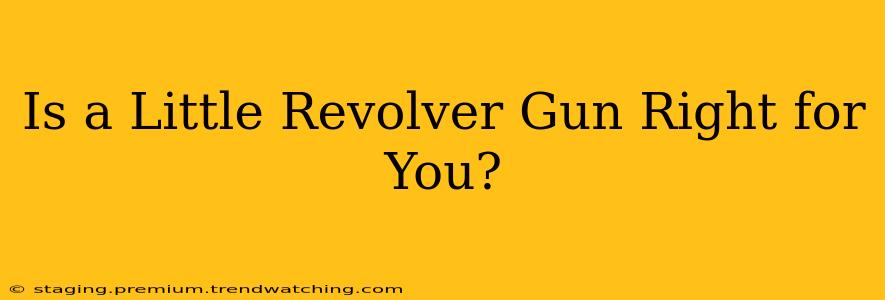Choosing the right firearm is a deeply personal decision, influenced by factors ranging from intended use to personal comfort and legal considerations. Revolvers, particularly smaller models, often appeal to those seeking a compact and reliable self-defense option. But is a little revolver gun truly the right choice for you? Let's delve into the pros and cons to help you make an informed decision.
What are the Advantages of a Small Revolver?
Small revolvers, often chambered in calibers like .22 LR, .38 Special, or .357 Magnum, offer several compelling advantages:
-
Simplicity and Reliability: Revolvers are known for their simple mechanical design. Fewer parts translate to less that can malfunction, making them highly reliable even under stress. This reliability is a significant draw for self-defense situations where a firearm's dependability is paramount.
-
Ease of Use: Their straightforward operation makes them relatively easy to learn and use, particularly for individuals new to firearms. The simple process of loading and unloading, and the intuitive nature of the action, contributes to their user-friendliness.
-
Compact Size and Concealability: Small revolvers are designed for easy concealment, making them a practical choice for everyday carry. Their smaller size and weight can be advantageous for individuals who need to carry a firearm discreetly.
-
Visual Deterrent: The visible cylinder and the potential for multiple shots can serve as a visual deterrent to potential attackers. This deterrent effect, while not a guarantee of safety, can be a significant factor in certain situations.
What are the Disadvantages of a Small Revolver?
While small revolvers possess many strengths, it's crucial to acknowledge their limitations:
-
Limited Capacity: Compared to semi-automatic pistols, revolvers generally have a lower ammunition capacity. This means fewer shots available in a self-defense scenario. This is particularly relevant with smaller revolvers, which often hold only five or six rounds.
-
Slower Reloading: Reloading a revolver typically takes longer than reloading a semi-automatic pistol. This can be a critical disadvantage in a high-stress situation where rapid follow-up shots are needed.
-
Recoil: While some smaller calibers have manageable recoil, others can be snappy, especially for those with smaller hands or less shooting experience. This can impact accuracy and control, especially during rapid fire.
-
Cost: Depending on the manufacturer and features, some small revolvers can be relatively expensive compared to semi-automatic pistols of similar caliber.
What Caliber is Best for a Small Revolver for Self-Defense?
The optimal caliber for a small self-defense revolver is a matter of debate and depends on individual needs and preferences. .38 Special and .357 Magnum offer greater stopping power than .22 LR, but they also produce significantly more recoil. .22 LR is easier to shoot and more readily available, but its stopping power is debatable. Consider factors like your physical strength, experience level, and local regulations when making this decision.
Are Small Revolvers Easy to Conceal?
Yes, the compact size of many small revolvers makes them relatively easy to conceal, especially with proper carry methods and clothing choices. However, proper training and understanding of concealment techniques are crucial to ensure safe and legal carry.
Are Small Revolvers Reliable for Self-Defense?
Small revolvers, when properly maintained, are generally highly reliable. Their simple design contributes to their dependability, reducing the likelihood of malfunctions under stress. However, regular cleaning and maintenance are essential to ensure continued reliability.
What is the Best Small Revolver for Beginners?
Choosing the "best" small revolver for beginners depends on individual preferences and physical capabilities. Factors such as recoil, ease of operation, and overall ergonomics should be carefully considered. Seeking advice from experienced shooters or firearm instructors can help you make an informed choice.
Conclusion:
The suitability of a little revolver gun for you hinges on your individual needs and circumstances. Carefully weigh the advantages and disadvantages, consider the caliber, and prioritize safety and training. If you're considering a small revolver for self-defense, consulting with a qualified firearms instructor is highly recommended before making a purchase. Remember, responsible gun ownership includes thorough training and a deep understanding of applicable laws and regulations.

